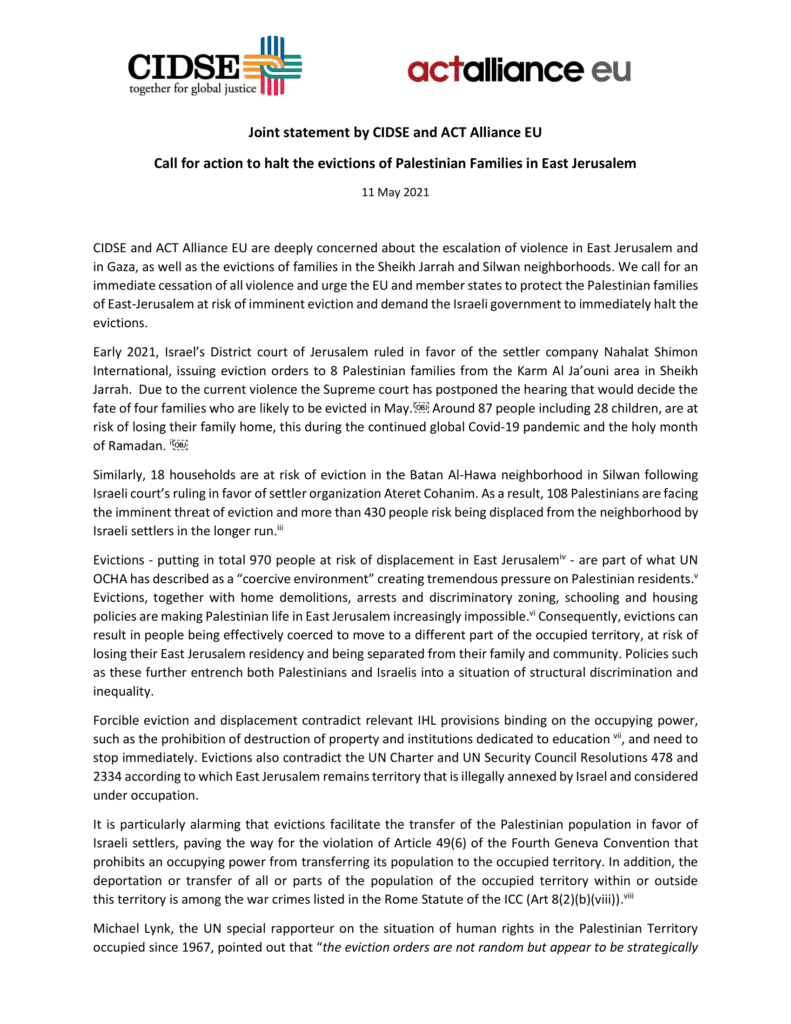CIDSE and ACT Alliance EU are deeply concerned about the escalation of violence in East Jerusalem and Gaza, as well as the evictions of families in the Sheikh Jarrah and Silwan neighbourhoods. We call for an immediate cessation of all violence and urge the EU and member states to protect the Palestinian families of East Jerusalem at risk of imminent eviction and demand the Israeli government to immediately halt the evictions.
In early 2021, Israel’s District Court of Jerusalem ruled in favour of the settler company Nahalat Shimon International, issuing eviction orders to eight Palestinian families from the Karm Al Ja’ouni area in Sheikh Jarrah. Due to the current violence, the Supreme Court has postponed the hearing that would decide the fate of four families who are likely to be evicted in May. Around 87 people, including 28 children, are at risk of losing their family home during the continued global COVID-19 pandemic and the holy month of Ramadan.
Similarly, 18 households are at risk of eviction in the Batan Al-Hawa neighbourhood of Silwan following an Israeli court’s ruling in favour of the settler organisation Ateret Cohanim. As a result, 108 Palestinians are facing the imminent threat of eviction, and more than 430 people risk being displaced from the neighbourhood by Israeli settlers in the long run.
Evictions – putting in total 970 people at risk of displacement in East Jerusalem – are part of what UN OCHA has described as a “coercive environment” creating tremendous pressure on Palestinian residents.
Evictions, together with home demolitions, arrests, and discriminatory zoning, schooling, and housing policies, are making Palestinian life in East Jerusalem increasingly impossible. Consequently, evictions can result in people being effectively coerced to move to a different part of the occupied territory, at risk of losing their East Jerusalem residency and being separated from their family and community. Policies such as these further entrench both Palestinians and Israelis in a situation of structural discrimination and inequality.
Forcible eviction and displacement contradict relevant IHL provisions binding on the occupying power, such as the prohibition of destruction of property and institutions dedicated to education, and need to stop immediately. Evictions also contradict the UN Charter and UN Security Council Resolutions 478 and 2334, according to which East Jerusalem remains a territory that is illegally annexed by Israel and considered under occupation.
The EU’s Foreign Ministers highlighted East Jerusalem demolitions and evictions as one of the particularly alarming developments on the ground that threaten to make the two-state solution impossible.
In this context, CIDSE and ACT Alliance EU urge the EU and Member States to:
- Call upon the Israeli government to immediately halt the evictions.
- Take immediate steps to protect Palestinians in East Jerusalem at risk of mass forcible transfer in
violation of international humanitarian law. - Request that the Israeli authorities, as per the UN Secretary General’s recommendation, review the
application of planning laws and policies to ensure that they are in accordance with Israel’s
obligations under international humanitarian law and international human rights law. - Follow up on recommendations made in EU Heads of Missions reports on East Jerusalem.
- Call upon the Israeli government to immediately halt the expansion of illegal settlements in the
OPT. - Actively support accountability for violations of international law by all parties, including
protecting the work and independence of the International Criminal Court (ICC).
